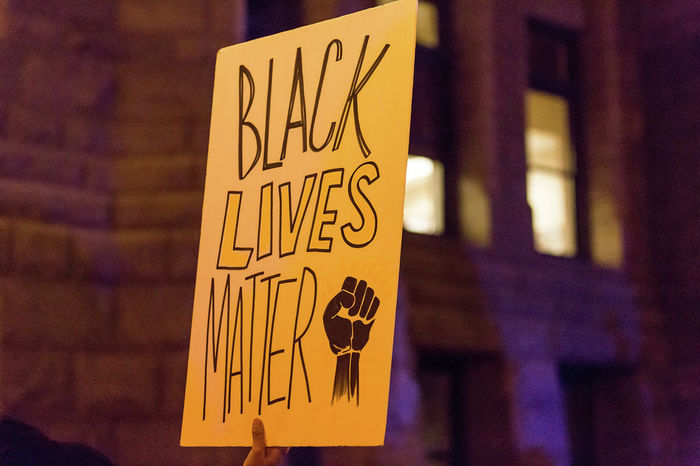The problem with statues, reading lists and what we call ‘activism’
An anonymous student criticises the way in which Black Lives Matter has been diluted down to ‘discourse’ about statues and reading lists, rather than the material demands of the Black community.

If I have to read one more thinkpiece by a non-Black person about the importance of tearing down statues of slave owners, I’m going to yell. I’ll save everyone’s time and tell you the answer: yes, take them down. But understand that Black Lives Matter is not simply a culture war between the British Left and Right, or an opportunity for the media to hold endless debates on the iconography of statues and whether Britain really is all that racist. We are letting discourse about statues divert attention from the fact that Black people are still being disproportionately killed, imprisoned, and arrested; Black British academics are still severely underfunded and underrepresented, and there is no effort made to educate the general public about Britain’s colonial past.
Aside from conversations about how BLM isn’t a trend and calls for people to take this movement seriously, the one thing which is everywhere is reading lists. 'Decolonial' reading lists, to be precise. And in Cambridge, an absolute shamble of an institution to say the very least, this seems exactly up every white, leftist, self-declared ‘activist’s' street: a chance to flex their intellectual muscles, to safely compartmentalise material oppression into an academic exercise. Not only are these so-called ‘Decolonial Reading Lists’ very often just average reading lists with a couple of Black authors sprinkled in for decoration, they’re just lists. Seldom do people actually read them and those who do too frequently just do so to gain the vocabulary to fling around in certain ‘activist’ circles. Nothing being learnt is being learnt for the purposes of equipping oneself for the self-denying journey towards a collective liberation. Material is being used to ensure that you have the right language for your tweets ‘exposing’ a fellow white person who hasn’t done their 'intersectional reading,' so you can ‘hold them accountable’ in a space where people can defer to your wokeness. Sure, some of you actually read these books because you care, but let’s not pretend that that’s the majority.
"I will not beg people to care about us, our humanity, our existence, our feelings."
I’d much rather have people who have not had the time to pore over every reading list under the sun but understand and practice genuine empathy, than those who thrive off of virtue signalling and woke positioning, in order to indulge in a performance of Who Can Point Out The Most Problems In This System. I will not beg people to care about us, our humanity, our existence, our feelings. But so many only care about sounding ‘right,’ knowing the technical jargon about Afro-pessimism and white supremacy, and being able to regurgitate theory from Black women to impress your fellow academics. As Lauren Michele Jackson highlighted beautifully in the article What Is an Anti-Racist Reading List For?, so many pathologise the Black experience and have been led to think you can find the white people’s guide for Blackness and anti-racism through the literary works of Toni Morrison and James Baldwin. But that’s the thing; they are literary works.
Morrison, Baldwin, Angelou, Walker, Lorde, all the (American) writers regularly added to these lists, wrote novels and poems, and essays; they did not write guides on how to ‘check your privilege’ and ‘unlearn white supremacy.’ These writers are some of the greatest of their kind who wrote about Black people and for Black people. Yet, you’re reading them because you believe Ms Morrison left you some poignant words of wisdom about how to be a better ally. Have you even attempted to read any non-white authors for any purpose other than ‘understanding the [insert ethnic group here] experience’? Appreciate the syntax. Enjoy the characterisation and plot. Stop combing through it for a sense of absolution, treating Black authors as racial educators.
"Black Lives Matter is first and foremost a material movement which demands structural, not just iconographic and symbolic change."
The simple truth is that if reading lists were the solution to racism, activists would have solved it years ago. If reading lists were the answer, this weird white guilt complex would be churning out a lot of more useful radicals who knew when to speak and when to simply share and donate. We have spoken about racialised privilege to death, but rarely do people actually use it.
Black Lives Matter is first and foremost a material movement which demands structural, not just iconographic and symbolic, change. Demand the colleges bankroll therapy for Black students and staff who are exhausted by the racism they face on a daily basis, and often underperform at assessment. Demand the departments fund Black scholarship, especially on a postgraduate level, which is where so many are discouraged from applying - due to wealth disparity and because repeating everything they experienced as undergrads in these ‘elite’ institutions does not seem worth it. Demand that colleges fire racist academics, or better, that faculty stop hiring racists for the sake of ‘academic freedom.’ Demand safety for ethnic minority students walking around Cambridge, in their departments, in their own colleges. Demand that lecturers who read or say the n-word or speak in blatant dog-whistles are disciplined. Demand that Black staff are paid properly. Demand that colleges stop gaslighting students and blackmailing them into staying quiet about their experiences of racism. Demand that Black Caribbean communities receive reparations from institutions built off of the backs of our ancestors. Demand that the university opens a department dedicated to Black Studies and funds it. Demand that Black students are not constantly given the laborious task of proving our experiences real via surveys and questionnaires. Demand that Black students and scholarship receive the funding they need and more when it comes to reimbursing their efforts to make the university look pathetically-less racist.
This is a long list, yes, but hardly exhaustive. The saddest thing is that for many, this seems a list of impossible demands, simply because you do not have the ability to imagine, to materially support Black students when we ask for what we actually need. Is your ‘activism’ just decoration for your CV, a benign social hobby to fill in your degree time in Cambridge? The simple truth is this: you cannot decolonise colonialism. Reading books, no matter how diverse and radical, do nothing if they are not followed by tangible, material change. And for Cambridge, the only decolonising you can do is dismantling it and redirecting that cold, hard cash.
 News / Report suggests Cambridge the hardest place to get a first in the country23 January 2026
News / Report suggests Cambridge the hardest place to get a first in the country23 January 2026 News / Students condemn ‘insidious’ Israel trip23 January 2026
News / Students condemn ‘insidious’ Israel trip23 January 2026 News / Cambridge ranks in the top ten for every subject area in 202623 January 2026
News / Cambridge ranks in the top ten for every subject area in 202623 January 2026 Comment / Cambridge has already become complacent on class23 January 2026
Comment / Cambridge has already become complacent on class23 January 2026 Comment / Gardies and Harvey’s are not the first, and they won’t be the last23 January 2026
Comment / Gardies and Harvey’s are not the first, and they won’t be the last23 January 2026










